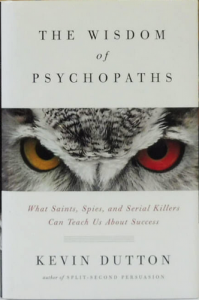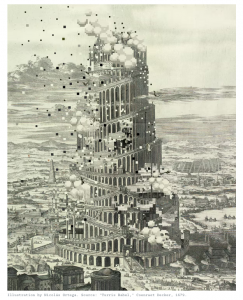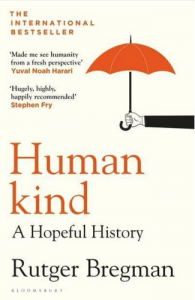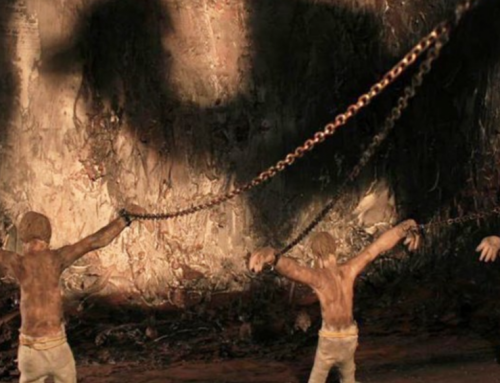Are Will Smith, Vladimir Putin, Donald Trump, Derek Chauvin, Ginni Thomas, Irma Grese, Marjorie Taylor Greene, angry truckers and KKK members just high profile primates in the lab of the failing human experiment?
[Photo Top row/L-R: Chris Rock/Will Smith; Vladimir Putin; George Floyd/Derek Chauvin; Bottom row/L-R: Trump; Kim Jong-un; Ginni Thomas/Clarence Thomas; KKK; Irma Grese (Senior Nazi SS Officer); Marjorie Taylor Greene; Kyle Rittenhouse; Hundreds of dead Indigenous children; angry trucker; Jan.6, 2021]
(20 min)
“Man with all his noble qualities, with sympathy which feels for the most debased, with benevolence which extends not only to other men but to the humblest living creature, with his god-like intellect which has penetrated into the movements and constitution of the solar system—with all these exalted powers—Man still bears in his bodily frame the indelible stamp of his lowly origin.” – Charles Darwin
Charles Darwin wrote this perspicacious claim in his 1860 book, The Descent of Man, nine years before Swiss biochemist Fredrich Miescher first discovered human DNA cells. Darwin recognized the evolutionary reality of our “indelible stamp” long before we began to understand the importance of Miescher’s DNA findings, and to this day, the vast majority of us living outside the scientific community have little understanding of how genetics impact our behavior.
“Rationality ought to be the lodestar for everything we think and do,” – Steven Pinker, author of Rationality: What It Is. Why It Seems Scare. Why It Matters.
Never have we had access to so much information while never before being more irrational. As Pinker points out, “the human being is portrayed as a caveman out of time … with a suite of biases, blind spots, fallacies and illusions.” Of course Pinker is a psychologist who tends to see the ‘glass half full’ and yet, in many ways we would be better off if we saw the glass half empty, or less.
Darwin would probably say we are a long way from getting the glass half full, despite believing ‘our cup runneth over.’
Our knowledge and understanding of us is severely limited and our existence on the planet is still in the experimental stage of evolution. Sharks have been here for 300 million years. Ants for a 100 million. Chimpanzees 50+ million. But the latest version of homo sapiens has only been here a couple hundred thousand years. We are adolescent primates and in the magnificent unfolding of the universe our species is in the embryonic stages of emerging from our “lowly origin.”
Of course, most of us would disagree and claim we are significantly evolved, citing a few thousand years of progress from cave art and savagery to space stations and Facebook. But are we? What’s a reasonable metric on which to judge our progress? What if we took a skeptical position? What if we formed a hypothesis based on a contrarian point of view? And gathered evidence to prove or disprove the hypothesis.
Hypothesis: Will Smith and Vladimir Putin are accurate representations of the how closely connected we are to “the indelible stamp of our lowly origin.” This is us.
Exhibit A: The slap and the war heard around the world
Admittedly, a slap in the face and genocidal killing are not to be equated … except in how they reflect the common denominator of our “indelible stamp.” Yes, there are extraordinary differences but there are similar, fundamental human characteristics:
- Smith had the power and opportunity to attack another human being
- Putin had the power and opportunity to attack other human beings
- Smith felt justified in ‘protecting’ his wife, in protecting his ‘identity’
- Putin felt justified in ‘protecting’ his country, and his ‘identity’
- Smith’s intellect was not able to think through or judge (humans are feeble at good judgement) the consequences of his attack
- Ditto Putin
- Both believed their positions of power protected them from serious repercussions
- Both sat back and watched the damage unfold with the satisfaction of having done the right thing to protect their self-defined identity
- Both acted out their deep-seated emotions of anger and fear processed through similar parts of their human anatomy, the reptilian brain and amygdala
Darwin’s reality is a slap in the face that should not be ignored. This is us.
Of course, the world is full of ‘good people’ – many more than bad – but the general perception of good should never distract us from the reality of the human condition and how the history of our species continues to prove Darwin’s theory. As have many other scientific findings in evolutionary biology, psychology and sociology. Plus, the empirical evidence we see in just recent history from Hitler, Putin and Trump to Will Smith, Ginni Thomas and Marjorie Taylor Greene (not to mention Caligula, Catherine de Medici, Attila the Hun, et al). All reaffirm the power of our primate genes and tribal identities.
Psychopathy – a sidebar
“The psychopaths and the anti-psychopaths sit within touching distance of each other. So near and yet so far.” – Kevin Dutton, author of The Wisdom of the Psychopaths (2012).
Too often ‘bad behavior,’ particularly violent, by humans is explained away by labeling it psychopathic and although psychopathy plays a role it is used as quick answer rather than an in depth explanation. Because it’s not an explanation, it’s a simplistic dismissal.
 Psychopathy, defined as a mental disorder, has been studied for centuries, more rigorously since the early 19th century, and today it remains anchored to the definition Hervey Cleckley put forth in his 1941 book, The Mask of Sanity. However, since then continuing research has formed a continuum that moves it away from being only a mental disorder to also being genetically rooted. Kevin Dutton’s excellent book, The Wisdom of the Psychopaths: What Saints, Spies and Serial Killers Can Teach Us About Success, exemplifies psychopathy and its manifestations on a spectrum that confirms it is a bigger part of many of us than we might think. It’s a partial explanation of human behavior but for purposes of this discussion it is a sidebar, a consideration but not crucial to the premise. It is only part of this is us. (BTW, highly recommend Dutton’s book – enlightening).
Psychopathy, defined as a mental disorder, has been studied for centuries, more rigorously since the early 19th century, and today it remains anchored to the definition Hervey Cleckley put forth in his 1941 book, The Mask of Sanity. However, since then continuing research has formed a continuum that moves it away from being only a mental disorder to also being genetically rooted. Kevin Dutton’s excellent book, The Wisdom of the Psychopaths: What Saints, Spies and Serial Killers Can Teach Us About Success, exemplifies psychopathy and its manifestations on a spectrum that confirms it is a bigger part of many of us than we might think. It’s a partial explanation of human behavior but for purposes of this discussion it is a sidebar, a consideration but not crucial to the premise. It is only part of this is us. (BTW, highly recommend Dutton’s book – enlightening).
“I told you so”

Darwin’s study at Down House (photo: McCabe)
What might we learn if we could have a cup of coffee with Charles Darwin and talk about the ensuing 160 years since his findings? It would probably be tea not coffee, and one of the takeaways would probably be the frequent utterance from Charles, “I told you so.”
Unfortunately, most of humankind has never wanted to accept Darwin’s foundational findings, as witnessed by the religious persecution he faced back then as well as condemnation for disrupting the social order of the time. And it’s no different today. We ignore the truth in his seminal discoveries and seldom hear any mainstream discussion about his work. When was the last time you heard talking-heads and pundits or so-called leaders invoke Darwin when pontificating on what’s wrong with global economics, world order, social norms, corrupt politics, toxic workplaces and failing religions? Seldom? Never? Below I cite a recent article in The Atlantic about the decline in American life and not once does it refer to our umbilical ties to Darwin’s universal findings.
“We have met the enemy and he is us.” – Pogo (1970)
The raw, unvarnished truth is hidden in our denial, in our lack of acceptance of observable truths.
We need leaders who use their understanding of our Darwinian nature (if they do) and apply it for the good of the people, not use it to prey on the people for the good of their own self-interests. Preying. That’s what it is. That’s what animals do, prey on the weak.
We see Harvard, Yale and Wharton educated politicians deliberately spewing lies and propaganda to stoke fear and distrust among us and yet we do nothing to prevent they’re preying on our fears. Better to be preyed open than face reality and admit we’re afraid. Better to rationalize their lies than admit we’re as culpable. Denial is a first line of defense against reality.
“Nothing to fear but fear itself.” – Franklin D. Roosevelt
Fear, of any kind, whether fear of “them” or “other” is used to tap into our genetic “fight or flight” response. And it works. And those in power know it. Fear can drive us to fight and storm Capitol buildings, burn cities, and kill ‘others’ of our species (Ukrainians, Russians, Blacks, Whites, Jews, Indigenous people, strangers). And flight is the dark silence of cowardice.
Politicians who are currently criticizing the teaching of ‘critical race theory’ in schools are basing it in fear. Fear of the truth. If they truly wanted to educate our children they would be advocating the teaching of all history and, most importantly, Darwin, rather than stoking faux fear. If we, and the next generation, had a clearer understanding of where we are on our evolutionary journey – not very far – then we just might develop a better understanding of how we can adapt as a species rather than become an endangered species (many claim we already are).
Our historical record is evidence that we lack the will and capacity to adapt.
“Man will become better when you show him what he is like.” – Anton Chekhov (1860-1904)
Anton Chekhov, another giant and contemporary of Darwin (in literature versus science), was probably not aware of Charles’s preeminence since he lived in Russia and was 22 years old when Charles died. But as a man of letters he knew we had to be shown the reality, and the fact that we are very much like the rest of the 6,000 mammalian species (chimpanzees are genetically 98.8% the same as homo sapiens). We ignore our origins and whistle past the human graveyard hoping things will get better (an estimated 110 billion humans have died since the pre-historic era, and approximately 1.6 billion in wars).
“Insanity is doing the same thing over and over and expecting different results.” – Albert Einstein
Chekhov’s hope that we will “become better” is nothing more than wishful-thinking and until we see that this is us, we will keep “doing the same thing over and over.” Because the vast majority of us do not want to see what we are like, which leads so-called leaders to avoid showing us and instead they follow their own instincts, ‘survival of the fittest.’ So the cycle continues and history repeats itself as the insanity of homo stupidus continues unabated.
This is us!
The photo montage above is an exhibit in the case against Chekhov’s hope and yet is only the tip of the homo sapiens iceberg. Ernst Haeckel, another contemporary of Chekhov, a Darwin advocate, a biologist, a eugenicist and philosopher, coined the term, homo stupidus, and described us as, “His thoughts and desires never soared beyond those of a brute.” The photo displays a few contemporary ‘brutes.’
Let’s briefly consider the opposing view that it’s not us, it’s ‘them’ – the ‘others,’ the government, the corporations, ‘big tech,’ et al.
Are we destined to live in the Tower of Babel?

Photo: The Atlantic
In a recent essay (April 11, 2022) in The Atlantic, Jonathan Haidt wrote an excellent, in depth essay, Why the Past 10 Years of American Life Have Been Uniquely Stupid. He says, “The story of Babel is the best metaphor I have found for what happened to America in the 2010s, and for the fractured country we now inhabit.” He asks us to “hold that dramatic image in our minds: people wandering amid the ruins, unable to communicate, condemned to mutual incomprehension.” Then he sets out a frightening narrative of how, in just the last decade, “America’s tech companies have rewired the world and created products that now appear to be corrosive to democracy, obstacles to shared understanding, and destroyers of the modern tower.”
“It’s about the shattering of all that had seemed solid, the scattering of people who had been a community.” – Jonathan Haidt
Haidt contends the current state of affairs is “not a story about tribalism; it’s a story about the fragmentation of everything.” And he marshals an impressive collection of facts, examples and stories to show us the situation is “bleak … for the next 5-10 years,” and cautions that rebuilding the Tower will require a “redesigning of democracy for the digital age.” What? The idea of “redesigning democracy” is just another in a long line of intellectual and emotional exercises that we humans fall back on rather than look in the mirror and see what we are really like. It’s Chekhov’s hope.
In the 6th century B.C., Solon, Cleisthenes, Ephialtes and a few other Greeks launched the startup called democracy, and we’ve been trying to bring it to fruition ever since. We’re still calling it an “experiment.” So, “redesigning” it would seem to be a tad ambitious, well above our pay grade and the potential we’ve displayed so far. Haidt admits such ambition “is far beyond my abilities,” and based on the evidence he asks, “Will we do anything about it?” Wrong question: It’s ‘can we?’ not ‘will we?’
It is far better to have the wrong answer to the right question than to have the right answer to the wrong question.
Don’t get me wrong. Haidt hits the nail – a contemporary problematic nail – on the head with his assessment but his narrative gives short-shrift to the underlying problem: us.
“Who let the dogs out?”
He places the primary cause on “structural stupidity” and rampaging technology (i.e., Facebook, Instagram, Twitter, et al) with a passing assignment of cause on the human factor – our fears, biases, anxieties and anger. He talks about our “knowledge-producing institutions” getting “stupider en masse,” which has compounded our confirmation biases and fragmented us in to “dart throwing” factions, but he never proclaims, we are the problem. He does mention our innate confirmation bias and a few behavioral examples of the deeper problem, whereby certain segments of our species are reverting back to our “lowly origins,’ but he doesn’t complete the circle, other than to say, “We must change ourselves and our communities.” He gives not one iota of evidence that we can change, fundamentally, nor does he dare to suggest that we can’t change. BTW, there’s never a mention of Darwin (perhaps he never read him or had a coffee with him?). This absence seems to lead to placing the ‘blame’ elsewhere. The Tower is collapsing and the guardrails are off mainly because the tech companies have “rewired the world” and they’re the ones “who let the dogs out.” That’s inadequate. It’s much more than that.
The technological rewiring has unleashed what has always been there, the hard-wired “indelible stamp” of our species. And even though we are not dogs, we are homo sapiens in the same mammalian category. That’s where the problem lies.
Darwin would say, “I told you so.”
In the end, Haidt writes, “It is a time of confusion and loss. But it is also a time to reflect, listen, and build.” Once again, this is ‘hope’ slipping back into the assessment and diverting us from seeing that the problem is, across millennial, us.
“We cannot expect Congress and the tech companies to save us. We must change ourselves and our communities.”
Really? Where’s the evidence that we can “change ourselves?” Adapt – in evolutionary terms?
Evidence to the contrary
Winston Churchill is attributed with saying, “History is written by the victor,” and as a man who helped lead a nation through a devastating war (like the horrors being repeated again, 80 years later, in Ukraine), he is somewhat qualified to reaffirm two realities: Victory has both costs and benefits (let’s stockpile nuclear weapons, that’ll prevent this happening again), and war is a heinous constant in human behavior. Not to focus on the travesty of war but to put an exclamation mark on the designation homo stupidus, we need to be reminded of the realities: At least 108 million people were killed by war in the twentieth century alone, and despite killing 20 million people in WWI (half civilians) and forming the League of Nations in 1920, here we are 100 years later showing the same animalistic behavior and blaming it on ‘other tribes.’ This is not adaptation. This is us.
We’re just shuffling the deckchairs on the Titanic when saving the ‘Good Ship Earth’ requires so much more than we are capable of.
The power of fiction
Why do we stay stuck in our own fiction, satisfied with just shuffling the deckchairs? To paraphrase the Jack Nicholson character in the movie, A Few Good Men, “We can’t handle the truth.” Give us anything but reality. Entertain and distract us (i.e., a $2 trillion industry); force-feed us what we want to hear (e.g., Fox News, CNN hyperbole, the Internet tsunami, ‘Jesus will save us,’ ‘There are virgins in heaven,’ ‘for God and country,’ ‘the ultimate sacrifice is patriotic’); and most importantly, lie to us (the essence of politics).
No matter what, never, ever tell us what we don’t want to hear.
Exhibit C
 Hell, there are countless bestselling books telling us stories that support the false promise that purity and goodness are just over the horizon on the other side of sin, corruption and democracy. Not true! Except, we want to be led down ‘the garden path.’ Exhibit C is made up of books like the Bible and its Garden of Eden. This bestseller was written about three thousand years ago by a bunch of guys and today is still religiously followed by more than a couple of billion people. And then a 1,000 years later, along came a newer version, a newer testament. And then 622 years after that, along came yet another version and today the Koran is must-reading for a couple billion people.
Hell, there are countless bestselling books telling us stories that support the false promise that purity and goodness are just over the horizon on the other side of sin, corruption and democracy. Not true! Except, we want to be led down ‘the garden path.’ Exhibit C is made up of books like the Bible and its Garden of Eden. This bestseller was written about three thousand years ago by a bunch of guys and today is still religiously followed by more than a couple of billion people. And then a 1,000 years later, along came a newer version, a newer testament. And then 622 years after that, along came yet another version and today the Koran is must-reading for a couple billion people.
Two books, one with a revised edition, and we now have more than half the world’s population with different stories and a rationale that splits them up and allows them to believe, “This is us. And ‘they’ are not us.” It makes no sense but it feels good.
We read, listen, filter and believe what we need in order to feel good, at least a little better, and steer clear of reality.
A more recent attempt to put a positive spin on our shuffling of the deckchairs was authored by Rutger Bregman, a Dutch historian who wrote, Humankind: A Hopeful History.
“Our secret superpower is our friendliness and ability to cooperate and yet, we’re also the cruelest of species.” – Rutger Bregman
 Rutger Bregman’s book takes a contrarian view to what most scholars, at least in the scientific field, consider reality. He declares, “We are hardwired for kindness, geared toward cooperation rather than competition and more inclined to trust rather than distrust one another.” This is exactly what most of us want to hear, and believe. Our belief system depends on it. He offers up considerable evidence but it’s presented through what seems to be a predetermined filter that supports his hypothesis rather than challenges it (after all he’s a historian, not a scientist).
Rutger Bregman’s book takes a contrarian view to what most scholars, at least in the scientific field, consider reality. He declares, “We are hardwired for kindness, geared toward cooperation rather than competition and more inclined to trust rather than distrust one another.” This is exactly what most of us want to hear, and believe. Our belief system depends on it. He offers up considerable evidence but it’s presented through what seems to be a predetermined filter that supports his hypothesis rather than challenges it (after all he’s a historian, not a scientist).
He writes about our “human destructiveness” and declares, “we’re not born to do this but we’re capable of it.” Read that again. It’s a contradiction hidden in an riddle without an explanation. The key phrase is, “we’re capable.” Therein lies the Achilles heel of the human species. A lion cub may not be born to kill but grown up it’s capable of it. This simplicity ignores the depth of findings in biology, psychology and sociology. Much of the evidence he offers falls somewhere between heuristics and incidental research, little anchored in large scale, established research. And he avoids Darwin’s basic principle of ‘survival of the fittest,’ and offers only a brief unsupportable criticism of Richard Dawkins and his groundbreaking book, The Selfish Gene (1976).
If Bregman wasn’t such a good writer I’d say he was a politician talking out of both sides of his mouth, wanting to have it both ways and knowing we humans desperately need to believe the good versus the bad, the fiction versus the reality. Many intellectual giants disagree with him, including Darwin, Dawkins, E. O. Wilson (too many seminal books to list), Helena Cronin (The Ant and the Peacock: Altruism and Sexual Selection from Darwin to Today) and Robert Axelrod (The Evolution of Cooperation). There are many more.
The book’s subtitle, “A Hopeful History,” reflects the reliance on hope rather than a convincing case. But hope aligns better with what we humans want.
“Worst of all, continual fear, and danger of violent death; and the life of man, solitary, poor, nasty, brutish, and short.” – Thomas Hobbes
Bregman’s rosy premise met with considerable criticism and many critics found the book misleading, “offering a false choice between Rousseau and Hobbes when, clearly, humanity encompasses both.” The book follows Rousseau’s idea that man was inherently virtuous prior to the corruption civilization brought. Even for a renowned philosopher like Rousseau that smacks of ‘rewriting our history’ to align with our eternal hope. Because civilization is a product of humans who are responsible for creating, managing and maintaining it. Rousseau wrote of a “natural man” who was empathetic, kind and virtuous but also driven by his need for survival, and like Bregman, contended that we can have it both ways. And we can, until push comes to shove – or a slap – and we have to decide what’s in our best interest versus someone else’s (to slaughter Ukrainians or not). When it comes to a ‘Sophie’s Choice,’ there’s little chance we humans will go against our self-interest. Darwin would look at us over his tea cup, smile, and say, ‘Only when it comes to kin might we forsake our self-interest.’
Make no mistake, Bregman puts forward a pile of evidence but facts, no matter how many, do not make a case, they just reaffirm what we want to hear and believe. He knows we want to believe we’re better than our sordid history and he has uncovered more than enough facts to lead us to his proffered Garden of Eden. But that doesn’t make it true. He also knows that hope in our better angels creates bestsellers. Ironically, Bregman provides several insights from Dawkins that counter his own argument.
“Let us try to teach generosity and altruism … because we are born selfish.” – Richard Dawkins
Forty years after its publication, the British public voted The Selfish Gene the most influential science book ever written. But countless readers felt dispirited upon reaching the end. ‘It presents an appallingly pessimistic view of human nature … and yet I cannot present any arguments to refute its point of view … I wish I could unread it.’ (Humankind p. 53)
When we can’t “unread” the truth, we deny it.
This ongoing debate cannot to be resolved here. But if we step back and observe current events and rather than see them as anomalies (primarily of the last decade according to Haidt), we see their commonality. There is a constancy across the brief arc of our history that indicates we have not evolved much – if at all – from “the indelible stamp of our lowly origin.” It should be self-evident. And recognizing, admitting, teaching and talking about it, just might be the best thing that we can do if we are to learn how to adapt.
The inability to adapt is the deadly flaw in homo stupidus.
“Lethal intelligence”
We need to study and think much, much more about how we accelerate our rate of adaption. It should be a key focus, an imperative, in our education.
‘Identity-protective cognition’ is an unconscious process in which we use our intelligence to filter out facts that are inconsistent with our ingrained beliefs and values and selectively accept those that reaffirm what we already believe.
“Lethal intelligence” is an incisive term attributed to Ernst Mayr, the renowned evolutionary biologist, that captures the essence of the human predicament:
- We have the intellectual capacity to split the atom but lack the capability to prevent splitting our species into warring factions
- We prioritize building nuclear missiles to kill millions of humans because they are not us, but do nothing to prioritize stopping viruses we know are coming to kill millions
- We stand by and watch ethnic cleansing and genocide rip through Rwanda and Bosnia, and thirty years later watch the same slaughter in Ukraine
- We tell ourselves Vladimir Putin, Slobodan Milosevic, Aldof Hitler, Donald Trump, Marjorie Taylor Greene, Kyle Rittenhouse and Joshua James do not really represent homo stupidus and our indelible stamp. We pretend they’re not “us”
Until we are willing, and capable, of seeing who we really are we will stand by and watch history repeat itself. Until we are able to breakthrough our ‘identity-protective cognition,’ we will live in denial. Until we learn how to “handle the truth,” we will live with the lies. Until we admit we are an endangered species, we will not adapt.
In order to disprove the hypothesis that this is us, we would need to explain that the same, basic human characteristics are not common in significant segments of humanity. Not common in: A gun-toting Kyle Rittenhouse, an angry wife of a Supreme Court Justice, a ‘hang Mike Pence’ patriot,’ a ‘Putin is smart’ con-man, and in predatory politicians like Cruz, Hawley and Greene? We need to be able to explain why they are just a few bad members of our species and do not represent an intrinsic swath of humanity. We need to explain why they are not the genetic realty that manifests itself when position and power are attained and the guardrails come off – no matter how momentary (gun-toting Rittenhouse or murderer Chauvin). Granted, not all of us would behave this way but, contrary to Chekhov’s hope, history has shown that too many of us do.
From Caesar and Caligula to Stalin and Trump, the commonality of the plots, characters and denouements are frighteningly similar.
“The Earth is a very small stage in a vast cosmic arena. Think of the endless cruelties visited by the inhabitants of one corner of this pixel on the scarcely distinguishable inhabitants of some other corner, how frequent their misunderstandings, how eager they are to kill one another, how fervent their hatreds. Think of the rivers of blood spilled by all those generals and emperors so that, in glory and triumph, they could become the momentary masters of a fraction of a dot.” – from The Pale Blue Dot by Carl Sagan (video: 3 min).
“Rivers of blood spilled … [so someone] could become the momentary master of a fraction of a dot.” This is our legacy. And despite libraries full of books trying to tell a different story, graveyards full of billions of humans confirm it: This is us.
Not that we believe it.
“None of us, thinking alone, is rational enough to consistently come to sound conclusions: rationality emerges from a community of reasoners who spot each other’s fallacies.” – Steven Pinker, Rationality.
In his book Rationality, Steven Pinker suggests that we need a “community of reasoners” to help us overcome our irrationality (good luck with that). This harkens back to the 4th century B.C. and Plato’s theory of “philosopher-kings” where Socrates posited that “cities [nation states] will never have rest from their evils,—no, nor the human race, as I believe,—and then only will this our State have a possibility of life and behold the light of day” (In 1651, Hobbes echoed the same incurable darkness).
Socrates also said, “The unexamined life is not worth living.” And yet, here we are with 2,400 years of examination and intellectual growth behind us, and we are still just talking and writing about “changing ourselves.”
Our species has had little to no substantive movement away from the behavior rooted in “the indelible stamp of our lowly origin.” And any debate on the affirmative, pro side that we will someday “behold the light of day” would appear to be refuted by a mountain of empirical evidence to the contrary. The position of the negative, con side of the debate would appear to support the hypothesis: This is us.







Leave A Comment